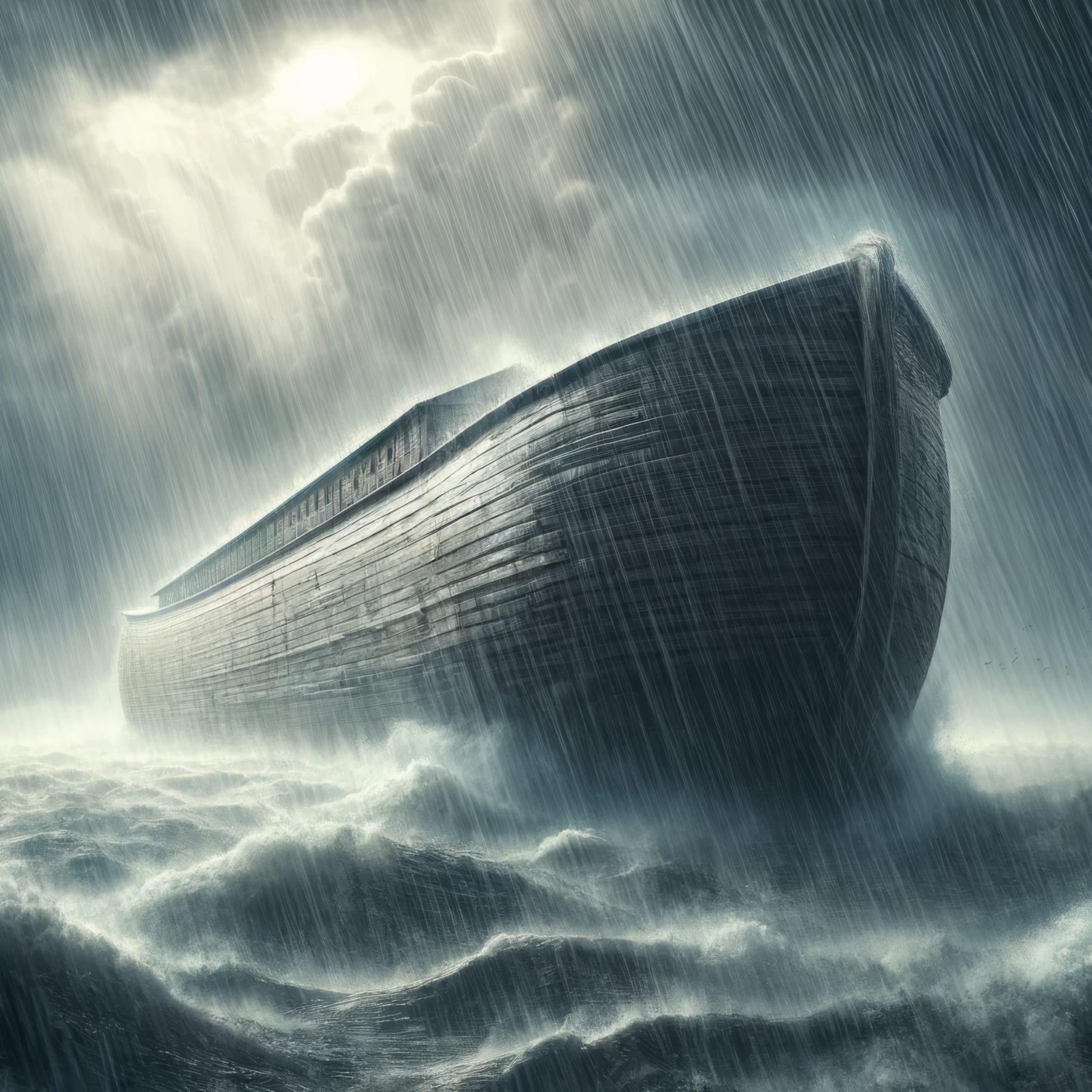One of the first things the Bible teaches us—right there in Genesis—is that God is a God of order. God separates: light from darkness, sea from sky, meaning from murk. God speaks, and the world takes shape. And when that order is rejected—as it was in Noah’s generation—judgment begins to flood in.
And then God makes Adam.
And what’s Adam’s job? He’s told to name the animals. That’s not just a fun afternoon of creative labeling. No—naming is an act of discernment. It’s how Adam participates in God’s ordering of creation. To name is to distinguish. To say, “This is not that.” And that’s the beginning of meaning. Without it, everything just melts into everything else.
And when that naming breaks down—when people stop honoring the distinctions God made—you don’t just get confusion. You get collapse.
That’s what happened in Noah’s day.
Genesis 6, the beginning of the Noah cycle, opens with a strange little passage that’s puzzled people for a long time. It talks about the Nephilim—these so-called “sons of God” who took “daughters of men” and had children with them. Some rabbis believed these “sons of God” were fallen angels. There’s even an old Jewish book called The Book of Enoch—it’s not in our Bibles, but Jude actually quotes it—that builds out that whole story.
Now, we don’t have to get lost in the weeds of exactly who the Nephilim were. Whatever the details, the message is clear: things were out of order. Boundaries were being crossed. The lines God had drawn between heaven and earth, divine and human, were being erased. That’s not how God designed things to work.
“The lines God had drawn between heaven and earth, divine and human, were being erased.”
God created humanity in His image—male and female, He called them, and He called them good. He didn’t bless hybrids. He didn’t call confusion good. What we see in this passage is a symbol of total rebellion—a society no longer content to live within the structure God created.
And when that happens—when God’s order is rejected and confusion takes over—judgment is never far behind.
Because when people stop calling sin “sin” . . . when they start calling evil good and good evil, the very fabric of creation begins to tear. The prophet Isaiah warned us about this. He said, “Woe to those…who put darkness for light, and light for darkness” (Isaiah 5:20, NKJV). In other words, when a society can no longer tell the difference between right and wrong—when everything becomes a shade of gray—that society is already under judgment. The flood doesn’t always come all at once. Sometimes it starts with a slow trickle. A compromise here, a redefinition there. But make no mistake—the rains have already started to fall, and the floodwaters are already beginning to rise.
That’s where Noah comes in.
In a world that had forgotten how to name, Noah remembered. Scripture says he was “a righteous man, blameless in his generation” (Genesis 6:9, NASB). It doesn’t say he was perfect. It doesn’t say he was the best of all time. Just that in his generation—in that mess of violence and confusion—he stood out.
“In a world that had forgotten how to name, Noah remembered.”
In fact, the old rabbis used to compare Noah to the patriarchs Abraham and Moses. When God told Abraham He was going to destroy Sodom, Abraham pushed back. He interceded. When God threatened to wipe out Israel, Moses begged for mercy. But not Noah. Noah doesn’t argue. He doesn’t plead. He just obeys. He builds the ark. He trusts God.
And maybe that’s what righteousness looks like in a generation like his. Not flashy. Not eloquent. Just faithful.
There’s a meme that’s made the rounds online the past few years. It shows a family from the 1950s—mom, dad, and the kids—all dressed in their Sunday best, Bibles under their arms, walking together to church. And the caption says, “This is what the revolution looks like.”
Now think about that.
In a culture with no center—where institutions are crumbling, where marriage is redefined, where truth is up for grabs—balance and order start to look like rebellion. In a world of constant noise, a family quietly bowing their heads to pray before dinner looks radical. Looking respectable, working an honest job, telling the truth, going to church, raising your kids to know right from wrong—those things used to be called normal. Now they’re countercultural.
But maybe that’s exactly the point.
When the world forgets how to live, the most faithful thing you can do is simply live rightly. Build your ark. Walk with God. Teach your kids what’s true. In a time like ours, sometimes the most revolutionary act is obedience.
“In a time like ours, sometimes the most revolutionary act is obedience.”
My wife and I served as missionaries in Slovakia for several years. Slovakia used to be part of Czechoslovakia—a communist country under Soviet control. After World War II, the Czech side, centered around Prague, became one of the most atheistic populations in the world. Even today, most Czechs say they don’t believe in God.
But Slovakia was different.
Not necessarily because the people were more devout—but because they were more distinct. In Slovakia, people clung to their Catholic faith. Not always because of deep conviction, but as a way of saying, “We are not them.” Their prayers and rituals became a form of resistance—a way of holding on to their identity in a culture that tried to flatten everything.
It wasn’t perfect. But it was something. A kind of spiritual muscle memory. A way of remembering that some things still mattered.
That’s what Noah was doing.
When he gathered the animals two by two, when he followed God’s instructions right down to the cubit and gopher wood, it wasn’t just about staying alive. It was about remembering. Preserving what God had made. He didn’t come up with the design himself—God gave it to him. Detailed, specific, measured. Because salvation doesn’t come from human creativity. It comes from obedience to revealed truth.
And Noah obeyed.
He brought the animals on board—the very creatures that Adam had once named. That’s important. He didn’t just preserve life. He preserved order. He carried the memory of Eden through the flood.
And sometimes, that’s the best we can do.
“He carried the memory of Eden through the flood. And sometimes, that’s the best we can do.”
In a world that’s lost its grip on the truth—in a time when right and wrong are treated like relics of the past—sometimes righteousness just means doing the next faithful thing. Building the ark. Following God’s Word. Preserving what’s worth preserving.
Noah did that.
And we’re here because he did.
Now if I can step aside for just a moment and reflect—not just biblically, but culturally—on what’s happening around us.
The Canadian philosopher Charles Taylor, in his magnificent work A Secular Age, describes how the modern West has undergone a long, slow process of disenchantment. Where our ancestors once saw the world as charged with meaning—as infused with God’s presence and populated with moral and spiritual realities—we now live in what Taylor calls a “buffered world.” A world where meaning no longer comes from outside us, but is generated from within. A world where, increasingly, reality is what we say it is.
The American theologian Carl Trueman, in his book The Rise and Triumph of the Modern Self, tracks this same trajectory through a more psychological lens. He says that we are living in a time when the categories that used to be obvious—natural, fixed, grounded in the created order—have been systematically dismantled.
Take something as simple as tomatoes.
It used to be that you couldn’t buy a tomato in January. You couldn’t get watermelon in February. There were seasons, and the land told you when things were ready. Now, of course, we can ship strawberries from Chile and apples from New Zealand. You can walk into a supermarket in midwinter and eat like it’s July.
“We are living in a time when the categories that used to be obvious—natural, fixed, grounded in the created order—have been systematically dismantled.”
Or take sex.
It used to be that you couldn’t engage in sex without a pretty good chance of having a baby. Now? With modern pharmaceuticals and surgical interventions, we’ve all but severed the connection between intimacy and fruitfulness. The act remains, but its meaning has been edited out.
Or take weather.
You can leave your air-conditioned home the week after the Fourth of July, drive in a climate-controlled car to a thermostatically-regulated office, and never once endure a temperature above 72 degrees. It’s July in Virginia, but your body still thinks it’s April in San Diego. What Trueman and Taylor both help us see is that the modern world has insulated us from the givenness of things. From the seasons. From the consequences. From the rhythms and restraints that once grounded human life in created reality.
Now hear me—I’m not suggesting that scientific progress is evil. I’m grateful for HVAC and antibiotics and winter tomatoes. But we have to be honest about what this insulation does to our souls. When we buffer ourselves from all friction, from all thorns and thistles, we lose touch with reality. And that loss doesn’t just show up in farming or fertility. It shows up in language.
Imagine going back in time 100 years and saying to your great-grandfather, “I feel like I’m a girl trapped in a boy’s body.” He wouldn’t get angry. He wouldn’t argue. He just wouldn’t understand. That sentence would sound to him like, “She looks like a fresh January daisy.” It simply wouldn’t compute. Not because he lacked compassion—but because he lived in a world where the body and the soul weren’t at odds. A world where meaning was not manufactured, but received.
“That loss doesn’t just show up in farming or fertility. It shows up in language.”
What we’re seeing today is not simply rebellion. It’s semantic collapse. It’s the inability of language to carry truth anymore. And that is far more dangerous than any tomato in January. Because once words lose their anchoring in reality, what’s left but flood?
And this is exactly what we see in Noah’s day. The boundaries are gone. Heaven and earth are mixed. Naming has collapsed. And so, the flood doesn’t just come as punishment—it comes as the consequence of a world that has lost the meaning of things.
But even in the flood, God was already making a way: the ark of Noah.
Similarly, Moses was placed in an “ark,” to preserve the identity of God’s people in the religious confusion of Egypt.
And think of how often, in the Gospels, Jesus is found in a boat—teaching the crowds, calming the storm, calling His disciples. It’s as if the early Christians saw in those stories a picture of their own calling. To be in the boat with Jesus. To ride out the waves with Him. To let Him still the storm.
Paul, writing to Timothy, warns of those who have “made shipwreck of their faith” (1 Timothy 1:19, ESV). The metaphor isn’t accidental. To abandon the truth is to jump overboard. But to remain with Christ—to remain in the Church—is to ride the ark safely to the other side.
There’s a very good reason that medieval churches and cathedrals were shaped according to the dimensions of the ark. The great Notre-Dame Cathedral, for example. In fact, they had an architectural feature called the “nave,” befitting the nautical design.
“To abandon the truth is to jump overboard.”
From Noah’s time up to now, the Church has always been God’s chosen vessel for preserving life, truth, and meaning. It’s the place where the naming continues. Where the Word is still spoken. Where order, dignity, and hope are carried forward through the flood.
So what about us?
If Noah preserved God’s order in his generation by building an ark, then we have that same calling. We don’t need to build with gopher wood and pitch, but we do need to live in such a way that the meaning of things, the order of God’s world, is not lost. We are called to build the ark of faithfulness in an age of confusion. We are called to be a preserving people.
So how do we do that? Let me give you five practical ways you can start building the ark today.
1. Tell the truth—especially when it costs you.
Ephesians 4:25 (NIV) says, “Therefore each of you must put off falsehood and speak truthfully to your neighbor, for we are all members of one body.” In a world that’s shipwrecked on lies—where people twist language and call darkness light—Christians must be known as truth-tellers. Build the ark by refusing to play games with words. Say what you mean. Speak with grace, but speak with clarity. When you honor truth, you help restore meaning.
2. Teach your children to name things rightly.
Deuteronomy 6:6–7a (NIV) says, “These commandments that I give you today are to be on your hearts. Impress them on your children. . . .” Don’t leave discipleship to YouTube or TikTok. You’re not just raising kids; you’re raising ark-builders. Teach them what’s right and what’s wrong. Teach them that male and female are good gifts from God. Teach them that words matter, bodies matter, and promises matter. Help them name the world correctly—just like Adam did.
3. Live in covenant faithfulness to your spouse and your church.
Malachi 2:15a (NIV) asks, “Has not the one God made you? You belong to him in body and spirit. And what does the one God seek? Godly offspring.” Covenant keeps chaos at bay. A faithful marriage is an ark. A church that keeps its promises is an ark. In a world drowning in consumerism and casual commitment, faithfulness is a rebellion. It’s how the Church holds the line.
4. Make worship a weekly anchor for your family.
Hebrews 10:25 (NIV) urges us, “Let us not give up meeting together, as some are in the habit of doing, but encouraging one another—and all the more as you see the Day approaching.” You build the ark when you build your life around worship. When Sunday morning isn’t optional. When your children grow up seeing Mom and Dad bowing in reverence before a holy God. Worship is where we remember who we are and who He is. It’s where the naming begins again.
“Worship is where we remember who we are and who He is. It’s where the naming begins again.”
5. Step into the waters of baptism and invite others in.
First Peter 3:20–21 (NIV) draws the line directly: “In the days of Noah . . . only a few people, eight in all, were saved through water, and this water symbolizes baptism that now saves you also . . .” The ark was lifted above the flood by the grace of God. In baptism, you pass through judgment and are raised to new life. If you haven’t yet taken that step—do it. Don’t wait. And if you have—don’t forget the mission. Go call others to the boat. Go proclaim that a greater ark has come, and His name is Jesus.
Friends, the rains have already started to fall. But God is still making a way.
Now’s the time: build the ark.












6 Responses
So good
Excellent! Requesting permission to use this article in a class we are about to lead at Red Bank Church of Christ based on The Disciple Making Grandparent by Upchurch and McCoy. This article would be a blessing to enhance the value of that study. Thank you!
What’s mine is yours, brother. SGD
This is an excellent article! I love the metaphor of the ark being like the church carrying God’s people through the flood! Well done!
You seem to not realize the corruption of the Church along with the world. “Going to Church” is not a part of the solution, its part of the problem. The Ark had godly design and so should the Church. Jesus didn’t design the Church as a place you go to where you are served the Church presentation by the professionals to the audience called congregation. This unbiblical design has kept God’s people believing in the word and concept of “laymen,” of which there is no such thing. It has kept them immature and dependent on “clergy.” We are the body of Christ and each one a gifted member, Saints, Priests, chosen and called, reduced to “laymen.” If the Church built according to God’s design as Noah did the Ark, perhaps we wouldn’t be here yet.
You’re so right, Larry. The church is part of the problem.
I’ve left several churches because the preaching wasn’t based on the Bible, and the people didn’t act Christlike.
Two different pastors at two different churches preached that David built the Temple!
[Nope! David’s son Solomon did.]
And that the Temple had concentric areas of increasing holiness unto the Holy of Holies!
[Nope! That sounds like Stonehenge. The Temple does have courtyards of “increasing holiness,” but they are not one inside of another, except the Holy Place/ Holy of Holies is inside the priestly area of the sacrifices.]
Re the congregation: at several churches I visited, the only person who spoke to me was the “greeter.” I guess everyone else thought “that’s not my job.”
(Now to be straight, I did approach and try to talk to several people. But most just said “Hi” and hurried away.
Some wouldn’t even make eye contact!)
I’m sorry. If someone can’t be cordial, if not friendly, in a church lobby, what is their witness to the world like?
If they are a “Christian,” then I don’t want to be called that.
I miss the fellowship of a church. But I don’t miss the bad teaching and the indifferent people.
And I haven’t left my Faith. I merely seek to be taught by the Spirit of YHVH, the Spirit of TRUTH.
And Yes, I know some people have fantastic, Bible-based preaching/ teaching and loving fellowship, and some – even disciple-making.
You praise and thank the Father for your blessing and opportunities.
Not everyone has what you have.
[FYI: I sought a disciple-maker at every church I tried. Never found one.
I even wrote the report from a “Discipling Task Force.”
The report was presented to church leadership and never heard of again.]
Blessings